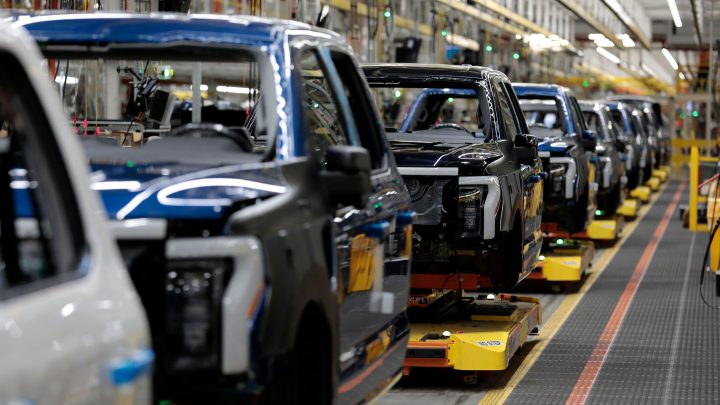
Ford is losing money on electric vehicles, but saving money on emissions fines
Ford is losing money on electric vehicles, but saving money on emissions fines

Ford released its fourth-quarter financial results Tuesday evening. While the carmaker expects to make over $10 billion in profit this year, it also expects to lose about $5 billion on its push to make and sell more electric vehicles.
But well into the earnings call, the company’s chief financial officer noted something else about its EVs. For every electric F-150 it sells, it can sell up to 12 gas-powered versions and still comply with emissions regulations, which are meant to curb pollution from gas-guzzling vehicles.
So how does that work?
Ever since the energy crises of the 1970s, the federal government has required car companies to make vehicles increasingly fuel-efficient through regulations known as CAFE standards, for “corporate average fuel economy.”
Stephanie Brinley, an associate director at S&P Global Mobility, said the “average” in that acronym is crucial because the government considers the fuel economy of all of a company’s vehicles put together.
“You’ve got electric vehicles and plug-in hybrids and hybrid vehicles that are more efficient than gasoline vehicles, and therefore offset what the gasoline vehicle is emitting,” she said.
If companies don’t meet emissions standards, they get fined.
So even though Ford is losing a lot of money right now on its EV business, selling an EV like the F-150 Lightning allows it to sell more gas-powered cars and trucks, and those make a lot more money.
Chris Douglas, a professor of economics at the University of Michigan-Flint, said if Ford didn’t have to meet those emissions standards, “it’d be a very open question if it would continue producing these electric pickup trucks, or if it would cease production to focus on something more profitable.”
In the early days, Ethan Elkind said, you wanted to encourage the legacy automakers to switch to electric vehicles. Elkind is director of the climate program at the Center for Law, Energy and the Environment at the University of California, Berkeley.
He said current regulations basically give companies extra emissions credit for EVs, and they were written before most car companies were producing any electric vehicles. But now that they are, “the problem is at a certain point, it becomes an excuse for them not to do more.”
That’s why the Joe Biden administration has proposed taking that extra credit away, essentially forcing car companies to sell a lot more EVs to avoid fines, Elkind said. But those regulations haven’t been finalized.
“There is a pretty long regulatory administrative process,” he said.
Bottom line, Elkind said, the outcome of the presidential election could determine whether those rules actually take effect.
There’s a lot happening in the world. Through it all, Marketplace is here for you.
You rely on Marketplace to break down the world’s events and tell you how it affects you in a fact-based, approachable way. We rely on your financial support to keep making that possible.
Your donation today powers the independent journalism that you rely on. For just $5/month, you can help sustain Marketplace so we can keep reporting on the things that matter to you.

















